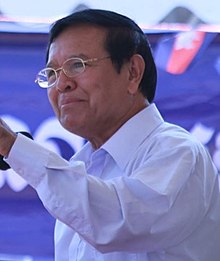Cambodia Is Trying to Snip a Color Revolution Attempt in the Bud

Featured image: Opposition leader Kem Sokha
The Cambodian opposition is urging the government to release their jailed leader.
Opposition leader Kem Sokha’s arrest in early September was due to leaked recordings from 2013 which allege that he was cooperating with US experts in a bid to seize power. The government says that he was fomenting a Color Revolution, while his supporters say that it’s normal in today’s world for political parties to seek a broad array of international advisory support before elections. It’s not clear whether the experts that Sokha was meeting with were intelligence agents or not, but any forthcoming information about these mysterious individuals’ intentions, the quality of their so-called advice, and their effective capabilities will help shed light on what was really going on.
In any case, the scandalous arrest has thrown the Cambodian National Rescue Party opposition into disorder because the law stipulates that no political party can be led by anyone who’s facing criminal charges, which means that they must either appoint someone else to take over the group or risk getting shut down and barred from participating in next year’s elections, which some observers predict might be neck-and-neck. It’s for this reason why the opposition and their international supporters have accused long-running Cambodian leader Hun Sen of framing Sokha in order to destroy the opposition and ensure the continuation of his rule.
As it always is whenever the US is implicated in a regime change plot, the matter isn’t as black and white as Washington and its partners are trying to portray it as. All domestic political factors aside, Cambodia is very strategically important nowadays because of its geographic location and relationship with China. President Hun Sen is one of Beijing’s closest partners, both in the diplomatic sense in terms of vetoing any hostile anti-Chinese motions by ASEAN and also in the economic one when it comes to Beijing’s One Belt One Road global vision of New Silk Road connectivity via forthcoming overland rail transit through Laos and current maritime accessibility through the Gulf of Thailand. From an American “zero-sum” perspective, Cambodia is seen as China’s “Trojan Horse” in Southeast Asia, and this is why President Hun Sen is being targeted for removal.
That said, the US is cautious about how much pressure it puts on him because it doesn’t want to instigate a regional crisis, or at least not at this point. Cambodia is also slated to play a crucial role in the joint Indo-Japanese “Asia-Africa Growth Corridor”, also known as the “Freedom Corridor”, because it’s a transit state along the Southern and Southern Coastal Corridors between Myanmar’s Japanese-invested Special Economic Zone port of Dawei in the Bay of Bengal and southern Vietnamese ports along the South China Sea. Although there’s also a Central Corridor connectivity route being planned, that would have to pass through the northeast Thai region of Isan, which might become a hotbed of the “Red Shirt’s” anti-junta unrest in the future.
Cambodia is therefore a safe bet for ensuring the strategic security of the Indo-Japanese initiative across mainland ASEAN, but only if they were confident that China couldn’t leverage its clout over President Hun Sen to influence their transport corridors, hence why they want him out. However, one interesting fact to keep in mind is that the opposition is more nationalist than the ruling party, and it has a long history of rallying its supporters against what it says is the government “selling out” their country’s interests to its neighbors. What this means is that the Cambodian National Rescue Party might inadvertently pose more of a strategic risk to the “Freedom Corridor” than President Hun Sen ever could, especially if it catalyzes a chain reaction of regional destabilization by trying to violently seize power in a Color Revolution coup.
The post presented is the partial transcript of the CONTEXT COUNTDOWN radio program on Sputnik News, aired on Friday Sep 29, 2017:
Andrew Korybko is an American Moscow-based political analyst specializing in the relationship between the US strategy in Afro-Eurasia, China’s One Belt One global vision of New Silk Road connectivity, and Hybrid Warfare.

